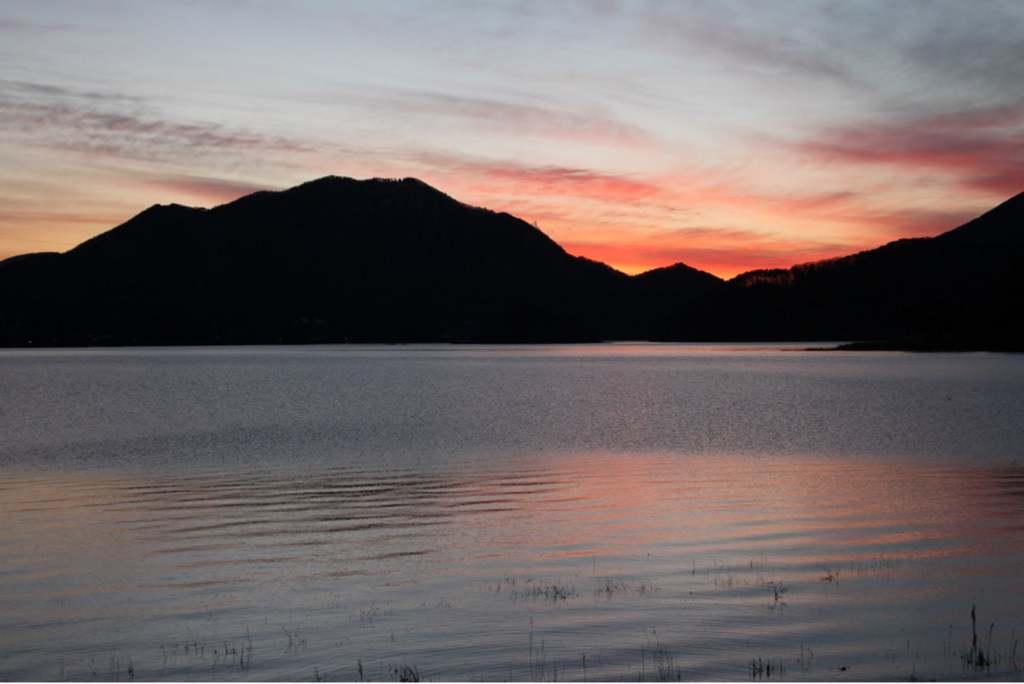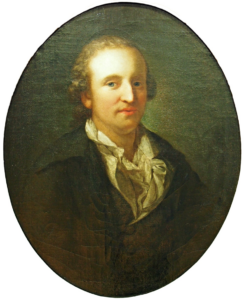To be sung on the water
(Poet's title: Auf dem Wasser zu singen)
Set by Schubert:
D 774
[1823]
Mitten im Schimmer der spiegelnden Wellen
Gleitet, wie Schwäne, der wankende Kahn.
Ach, auf der Freude sanft schimmernden Wellen
Gleitet die Seele dahin wie der Kahn;.
Denn von dem Himmel herab auf die Wellen
Tanzet das Abendrot rund um den Kahn.
Über den Wipfeln des westlichen Haines
Winket uns freundlich der rötliche Schein.
Unter den Zweigen des östlichen Haines
Säuselt der Kalmus im rötlichen Schein.
Freude des Himmels und Ruhe des Haines
Atmet die Seel im errötenden Schein.
Ach, es entschwindet mit tauigem Flügel
Mir auf den wiegenden Wellen die Zeit.
Morgen entschwindet mit schimmerndem Flügel
Wieder wie gestern und heute die Zeit,
Bis ich auf höherem strahlendem Flügel
Selber entschwinde der wechselnden Zeit.
In the middle of the shimmer of the mirroring waves
The rocking boat is gliding like swans;
Oh, on the gently shimmering waves of joy
The soul is gliding along like the boat;
Because coming down from the sky onto the waves
The sunset is dancing around the boat.
Over the treetops of the woods in the west
The reddish glow is beckoning to us in a friendly way;
Under the branches of the woods in the east
The acorus plants are rustling in the reddish glow;
The joy of heaven and the calm of the woods –
The soul is breathing these in in the reddening glow.
Oh, with its dewy wings it is vanishing,
Time is vanishing for me on these rocking waves;
With shimmering wings it is going to vanish tomorrow
Again, time will vanish like yesterday and today,
Until I, on higher, beaming wings,
Myself vanish into changing time.
All translations into English that appear on this website, unless otherwise stated, are by Malcolm Wren. You are free to use them on condition that you acknowledge Malcolm Wren as the translator and schubertsong.uk as the source. Unless otherwise stated, the comments and essays that appear after the texts and translations are by Malcolm Wren and are © Copyright.
☙
Themes and images in this text:
Boats Breath and breathing Dancing Dew East and West Evening and the setting sun Heaven, the sky Joy Mirrors and reflections On the water – rowing and sailing Red and purple Rocking Soul Surface of the water Time Waves – Welle Wings Woods – groves and clumps of trees (Hain)
When this poem was published in 1782 the poet gave it the title and dedication: ‘Lied auf dem Wasser zu singen, für meine Agnes’ (Song to be sung on the water, for my Agnes). He had written it while on his honeymoon with Agnes von Witzleben earlier that year. However, she was to die in 1788, at the age of 27. In her case, the prediction of dispersal into timelessness in the final stanza came about all too soon.
Before he met Agnes, Stolberg-Stolberg had been a central figure in the Göttinger Hainbund (‘the Göttingen Grove Alliance’), a group of poets who had a particular veneration for Klopstock. On 15th June 1775 a number of this group joined Goethe on an expedition to (and on) Lake Zurich to celebrate the 25th anniversary of Klopstock writing his great Ode, ‘Der Zürchersee‘. This day out on the water (and having a picnic on the southern shore of the lake) inspired Goethe’s ‘Auf dem See‘ (Schubert’s D 543), and it almost certainly fed into Stolberg-Stolberg’s ‘Auf dem Wasser zu singen‘. The second stanza of Klopstock’s Ode (addressed to ‘Mother Nature’) seems to introduce the main images of Stolberg’s later text: a shimmering lake, descending reddening beams, and evening wings that can lift us out of the flux of time.
Von des schimmernden Sees Traubengestaden her,
Oder, flohest du schon wieder zum Himmel auf,
Komm in röthendem Strale
Auf dem Flügel der Abendluft
Come back from the grape-lined banks of the shimmering lake,
Or, if you have already flown off back to the heavens,
Come back in reddening beams,
On the wings of evening air.
Unlike Goethe’s Auf dem See, Stolberg’s barcarole is clearly an evening song. As the sun sets, our thoughts turn to where we are in time and space. We become more aware of the passing of time as the end of the day presages a more final closure. We are in the middle of our course across the waters of life. We look back to yesterday and forward to tomorrow and recognise that these too are waves on which we are gliding like swans. Like swans, too, might we be able to stretch out our wings and take flight?
Although we are singing ‘on’ the water, the red glow that surrounds us comes to us (and beckons to us) from above. Even ‘under’ the branches of the trees it is the heavenly glow from the sun that stirs the acorus plants. The surface of the water prevents us from looking down; it is a mirror that inspires us to look up and yearn for flight. This is not a poem that is primarily about water.

☙
Original Spelling and note on the text Auf dem Wasser zu singen Mitten im Schimmer der spiegelnden Wellen Gleitet, wie Schwäne, der wankende Kahn; Ach, auf der Freude sanftschimmernden Wellen Gleitet die Seele dahin wie der Kahn; Denn von dem Himmel herab auf die Wellen Tanzet das Abendroth rund um den Kahn. Ueber den Wipfeln des westlichen Haines Winket uns freundlich der röthliche Schein; Unter den Zweigen des östlichen Haines Säuselt der Kalmus im röthlichen Schein; Freude des Himmels und Ruhe des Haines Athmet die Seel' im erröthenden Schein. Ach, es entschwindet mit thauigem Flügel Mir auf den wiegenden Wellen die Zeit; Morgen entschwindet1 mit schimmerndem Flügel Wieder wie gestern und heute die Zeit, Bis ich auf höherem strahlendem Flügel Selber entschwinde der wechselnden Zeit. 1 Schubert appears to have changed Stolberg's original 'entschwinde' (may it vanish) to 'entschwindet' (it is going to vanish).
Confirmed by Peter Rastl with Schubert’s source, Gedichte der Brüder Ch. und F. L. Grafen zu Stolberg. Zweyter Theil. Neueste Auflage. Wien 1817. Bey B. Ph. Bauer. page 64; with Gedichte der Brüder Christian und Friedrich Leopold Grafen zu Stolberg. Erster Theil. Wien, 1821. Im Verlage bei J.B. Wallishausser. Hamburg, bei Perthes und Besser, pages 319-320; and with Musen Almanach für 1783. Herausgegeben von Voß und Goeking. Hamburg bei Carl Ernst Bohn, pages 168-169.
To see an early edition of the text, go to page 64 [76 von 354] here: http://digital.onb.ac.at/OnbViewer/viewer.faces?doc=ABO_%2BZ160626701


